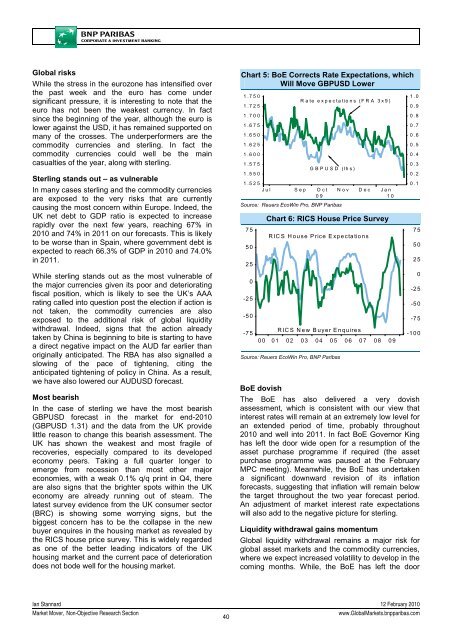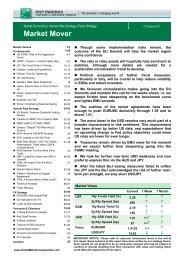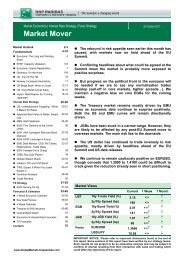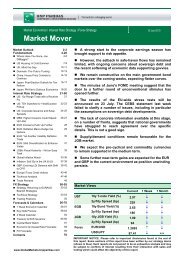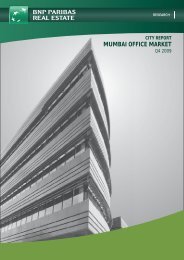Market Mover - BNP PARIBAS - Investment Services India
Market Mover - BNP PARIBAS - Investment Services India
Market Mover - BNP PARIBAS - Investment Services India
You also want an ePaper? Increase the reach of your titles
YUMPU automatically turns print PDFs into web optimized ePapers that Google loves.
Global risks<br />
While the stress in the eurozone has intensified over<br />
the past week and the euro has come under<br />
significant pressure, it is interesting to note that the<br />
euro has not been the weakest currency. In fact<br />
since the beginning of the year, although the euro is<br />
lower against the USD, it has remained supported on<br />
many of the crosses. The underperformers are the<br />
commodity currencies and sterling. In fact the<br />
commodity currencies could well be the main<br />
casualties of the year, along with sterling.<br />
Sterling stands out – as vulnerable<br />
In many cases sterling and the commodity currencies<br />
are exposed to the very risks that are currently<br />
causing the most concern within Europe. Indeed, the<br />
UK net debt to GDP ratio is expected to increase<br />
rapidly over the next few years, reaching 67% in<br />
2010 and 74% in 2011 on our forecasts. This is likely<br />
to be worse than in Spain, where government debt is<br />
expected to reach 66.3% of GDP in 2010 and 74.0%<br />
in 2011.<br />
While sterling stands out as the most vulnerable of<br />
the major currencies given its poor and deteriorating<br />
fiscal position, which is likely to see the UK’s AAA<br />
rating called into question post the election if action is<br />
not taken, the commodity currencies are also<br />
exposed to the additional risk of global liquidity<br />
withdrawal. Indeed, signs that the action already<br />
taken by China is beginning to bite is starting to have<br />
a direct negative impact on the AUD far earlier than<br />
originally anticipated. The RBA has also signalled a<br />
slowing of the pace of tightening, citing the<br />
anticipated tightening of policy in China. As a result,<br />
we have also lowered our AUDUSD forecast.<br />
Most bearish<br />
In the case of sterling we have the most bearish<br />
GBPUSD forecast in the market for end-2010<br />
(GBPUSD 1.31) and the data from the UK provide<br />
little reason to change this bearish assessment. The<br />
UK has shown the weakest and most fragile of<br />
recoveries, especially compared to its developed<br />
economy peers. Taking a full quarter longer to<br />
emerge from recession than most other major<br />
economies, with a weak 0.1% q/q print in Q4, there<br />
are also signs that the brighter spots within the UK<br />
economy are already running out of steam. The<br />
latest survey evidence from the UK consumer sector<br />
(BRC) is showing some worrying signs, but the<br />
biggest concern has to be the collapse in the new<br />
buyer enquires in the housing market as revealed by<br />
the RICS house price survey. This is widely regarded<br />
as one of the better leading indicators of the UK<br />
housing market and the current pace of deterioration<br />
does not bode well for the housing market.<br />
Chart 5: BoE Corrects Rate Expectations, which<br />
Will Move GBPUSD Lower<br />
1.750<br />
1.725<br />
1.700<br />
1.675<br />
1.650<br />
1.625<br />
1.600<br />
1.575<br />
1.550<br />
1.525<br />
Jul<br />
Rate expectations (FRA 3x9)<br />
GBPUSD (lhs)<br />
Source: Reuers EcoWin Pro, <strong>BNP</strong> Paribas<br />
75<br />
50<br />
25<br />
0<br />
-25<br />
-50<br />
-75<br />
Sep Oct Nov Dec Jan<br />
09<br />
10<br />
Chart 6: RICS House Price Survey<br />
RICS House Price Expectations<br />
RICS New Buyer Enquires<br />
00 01 02 03 04 05 06 07 08 09<br />
Source: Reuers EcoWin Pro, <strong>BNP</strong> Paribas<br />
BoE dovish<br />
The BoE has also delivered a very dovish<br />
assessment, which is consistent with our view that<br />
interest rates will remain at an extremely low level for<br />
an extended period of time, probably throughout<br />
2010 and well into 2011. In fact BoE Governor King<br />
has left the door wide open for a resumption of the<br />
asset purchase programme if required (the asset<br />
purchase programme was paused at the February<br />
MPC meeting). Meanwhile, the BoE has undertaken<br />
a significant downward revision of its inflation<br />
forecasts, suggesting that inflation will remain below<br />
the target throughout the two year forecast period.<br />
An adjustment of market interest rate expectations<br />
will also add to the negative picture for sterling.<br />
Liquidity withdrawal gains momentum<br />
Global liquidity withdrawal remains a major risk for<br />
global asset markets and the commodity currencies,<br />
where we expect increased volatility to develop in the<br />
coming months. While, the BoE has left the door<br />
1.0<br />
0.9<br />
0.8<br />
0.7<br />
0.6<br />
0.5<br />
0.4<br />
0.3<br />
0.2<br />
0.1<br />
75<br />
50<br />
25<br />
0<br />
-25<br />
-50<br />
-75<br />
-100<br />
Ian Stannard 12 February 2010<br />
<strong>Market</strong> <strong>Mover</strong>, Non-Objective Research Section<br />
40<br />
www.Global<strong>Market</strong>s.bnpparibas.com


